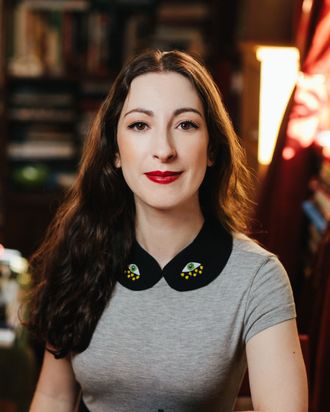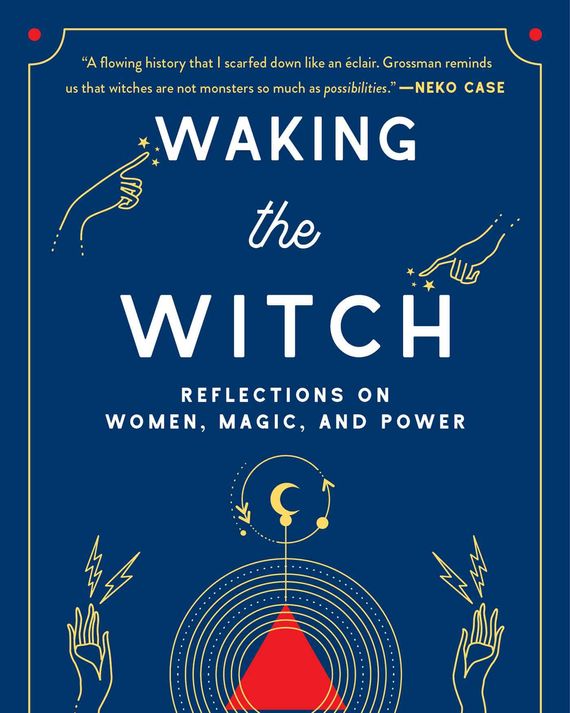
ThereÔÇÖs a dizzying array of podcasts dedicated to the occult, from everyday practitioners tapped into all sorts of arcane traditions to historical overviews from outsiders. Although there are plenty of femme witch-centric broadcasts to tune into, all with their own charms, Pam GrossmanÔÇÖs┬áThe Witch Wave┬ástands out among the pointy-hatted crowd. Grossman is a writer, curator, and lecturer who IÔÇÖve come to think of as a mystical Terry Gross ÔÇö her mellifluous voice plays a major part in warding off my Sunday Scaries as she interviews everyone from Jinkx Monsoon to┬áCirce┬áauthor Madeline Miller, alongside witchy experts Rachel True, art adviser/curator and color magic witch Sarah Potter, and astrologer Jessica Lanyadoo.
In addition to keeping a lively lecture schedule and maintaining the art and occult blog Phantasmaphile for well over ten years, GrossmanÔÇÖs second book, Waking the Witch, flies onto shelves today. In it, she writes eloquently about witchy fine artists like Hilma af Klint, whose Guggenheim retrospective captivated museum visitors, the feminist underpinnings of The Wizard of Oz, MacbethÔÇÖs weird sisters, and more.
I met with Grossman in a tiny tea shop in the East Village to chat about pop occulture, what itÔÇÖs like to marry a Muggle, and ÔÇ£Grand High WitchÔÇØ RuPaul.
What kind of reader do you hope to attract with Waking the Witch, beyond the witch community?
When I was writing this book, it was important to me that it wasnÔÇÖt just for people who practice witchcraft or even necessarily identify as witches. Absolutely, I want those people to read the book too, but the witch is an archetype that resonates with feminists, it resonates with artists, it resonates with anybody who I believe is tired of being told that women are supposed to be passive and non-dynamic.
My theory is that the reason weÔÇÖre seeing so much of the occult and magic and these figures in the zeitgeist lately is partially because people who are creating the current zeitgeist ÔÇö TV, media, music, fashion ÔÇö are all of a generation that were the outsider kids being weird, reading all of these creepy books.
I think thatÔÇÖs definitely part of it, and certainly when I was growing up in the ÔÇÖ90s, there was the third wave of feminism happening. There was interest in the occult, in Buffy and Charmed and The Craft, and all of the pop occulture that was happening, not to mention there were so many comic books and so many bands that I loved that had an occult tinge to them. My holy trinity was Tori Amos, PJ Harvey, and Bj├Ârk, and I read Sandman comics and I loved Alan Moore, so I think thatÔÇÖs part of it. Whatever subculture you grow up with, once you start becoming the people that are making the culture, you are going to have homages to that, youÔÇÖre going to infuse whatever youÔÇÖre making with the things that inspire you.
But I actually think itÔÇÖs bigger than just that. A few of the reasons that witchcraft is on the rise right now is that it is distinctly anti-patriarchal, and whether you love witches from a spiritual standpoint or a political standpoint or a cultural standpoint, itÔÇÖs a symbol that rebellious women can latch onto because it symbolizes resistance against hegemony and oppression by the white cis heteronormative patriarchy.
IÔÇÖm familiar with the term ÔÇ£pop occulture,ÔÇØ but can you define it for me?
To me, pop occulture is when anything with an occult, a magical or esoteric bent to it, suddenly starts appearing in fashion or film or music or TV shows ÔÇö when the mass culture starts to incorporate some of these threads of the occult into their story lines and symbols. The Chilling Adventures of Sabrina is a great example of pop occulture, not just because sheÔÇÖs a witch, but because the writers have done their research. TheyÔÇÖre name-checking famous occult grimoires, and theyÔÇÖre name-checking alchemists and real historical figures that magic nerds like me get really excited about. TheyÔÇÖre using a lot of the symbols and the aesthetics of the occult but doing it in this fun, pop-culture way.
ItÔÇÖs really interesting, too, to see how the language of magic is surrounding us all the time. The idea that ÔÇ£manifestingÔÇØ is something that Oprah says now, and itÔÇÖs pretty amazing when you think about how magical of a word that is. So many of my pop-culture heroes, like RuPaul, talk all the time about shape-shifting and how their art is a spell or how theyÔÇÖre using their creativity to transform their identities or transform the world. The idea of glamour is a magical idea. The words ÔÇ£glamourÔÇØ and ÔÇ£grimoireÔÇØ and ÔÇ£grammarÔÇØ all come from the same root, so you can really see this idea of creativity and magic being interlinked.
I feel like the question about trendiness and witches comes up again and again in interviews with you. IÔÇÖm wondering if thereÔÇÖs something you want to be asked about that no one ever asks you about, like, whatÔÇÖs it like to date as a witch?
I find it really interesting to talk about the ways in which people who identify as witches interface with muggles. IÔÇÖm married to a muggle. A lot of the people in my life certainly are magical or identify as witches or have some kind of alternative spiritual practice, but a lot of them donÔÇÖt, and the amount of acceptance and love that IÔÇÖve experienced in my life has been really meaningful to me. But IÔÇÖve definitely had to have some conversations with people to try to assure them about what I mean when I call myself a witch, because there is still a stigma attached to it and, letÔÇÖs be honest, IÔÇÖm extremely lucky that I live in a liberal city and can be out and about with my spirituality and my identity.
There are so many places in this country, let alone in the world, where to be called a witch is to risk danger, and so I find it interesting to talk about witches with day jobs, and I find it interesting to talk about witches in relationships with people who are not witches. ItÔÇÖs both as mysterious and as strange and maybe even more so than someone might believe in certain ways, and in other ways, itÔÇÖs as normal and mundane as you can imagine, too.
Sometimes when people talk about the trendiness of witches, it comes with a little bit of an eye roll, and I take issue with that  I think if it was mostly men who were gravitating toward witchcraft, it would be taken a lot more seriously. People who gravitate toward the archetype of the witch, some of them are doing it because maybe they think its cool or they think its fun or they think its a little spooky, [but] a lot of people are doing it because it has deep value for them. It is liberating for them, it is healing for them, it gives them a sense of strength and purpose, it opens up great wells of compassion, and it empowers them to make changes within themselves and within the world. Thats fucking meaningful, and I think that witches are the future. I really believe that.
In general, most things in pop culture that are of interest to people who are socialized as women are totally derided.
Like I said, I was all about Tori Amos and Bj├Ârk and PJ Harvey, and I remember there being this attitude of, especially with Tori, like, ÔÇ£Oh, youÔÇÖre going to put on your fairy wings and go to the Tori Amos concert, and sheÔÇÖs so loopy!ÔÇØ IÔÇÖm sorry, this was a woman who was singing about sexual abuse, she was singing about her own lust and desire, she was singing about religion and wanting to find the divine feminine because the religion she was brought up in was failing her and making her feel shame. ThatÔÇÖs powerful, liberating conversation, and messages that I needed to hear when I was 14 years old. I would argue that a lot of those same messages are coming through, whether subtly or more overtly, in witch culture right now.
So much of the conversation about witches has to do with the fear of female sexuality and the fear of female bodies. Before the 20th century, a lot of witches traditionally were depicted as either old and terrifying and hideous or as young seductresses who would bring about your downfall. Its that virgin-slut paradigm or its the young-old paradigm. There was no one, complicated witch that was a little of both. Were seeing that now with new depictions of witches, which is really exciting, and I think they say a lot about how far weve evolved. The fact that there can be The Chilling Adventures of Sabrina featuring this young character whos grappling with her own feminism and her own sense of social justice and autonomy, thats pretty powerful  I believe that the witches in pop culture also reflect the kind of women that society is comfortable with or is afraid of.
Who are your dream guests for the podcast?
RuPaul. Drag is such a great example of witchcraft, and thatÔÇÖs why IÔÇÖve had a few drag queens on my show ÔÇö because IÔÇÖm really entranced by the idea that everything is an illusion. By using our imaginations, we can play with reality, and we can show that because everything is an illusion, we have the power to re-create it in as beautiful and delightful and loving and fun a way possible, and thatÔÇÖs the kind of witchcraft that I want to be part of making and part of promoting. And RuPaul is just an excellent example. I call him a ÔÇ£Grand High WitchÔÇØ in my book.
ThereÔÇÖs this phrase I use all the time on the podcast, which is ÔÇ£reverent irreverence,ÔÇØ and that to me is how I want to move in the world ÔÇö in this state of absolute awe and absolute silliness, because we are surrounded by mystery all the time, and no matter how many questions we ask, weÔÇÖre never going to get the answers. And thatÔÇÖs fucking hilarious and delightful and strange and peculiar, and itÔÇÖs all serious and so none of it should be taken seriously at all.


